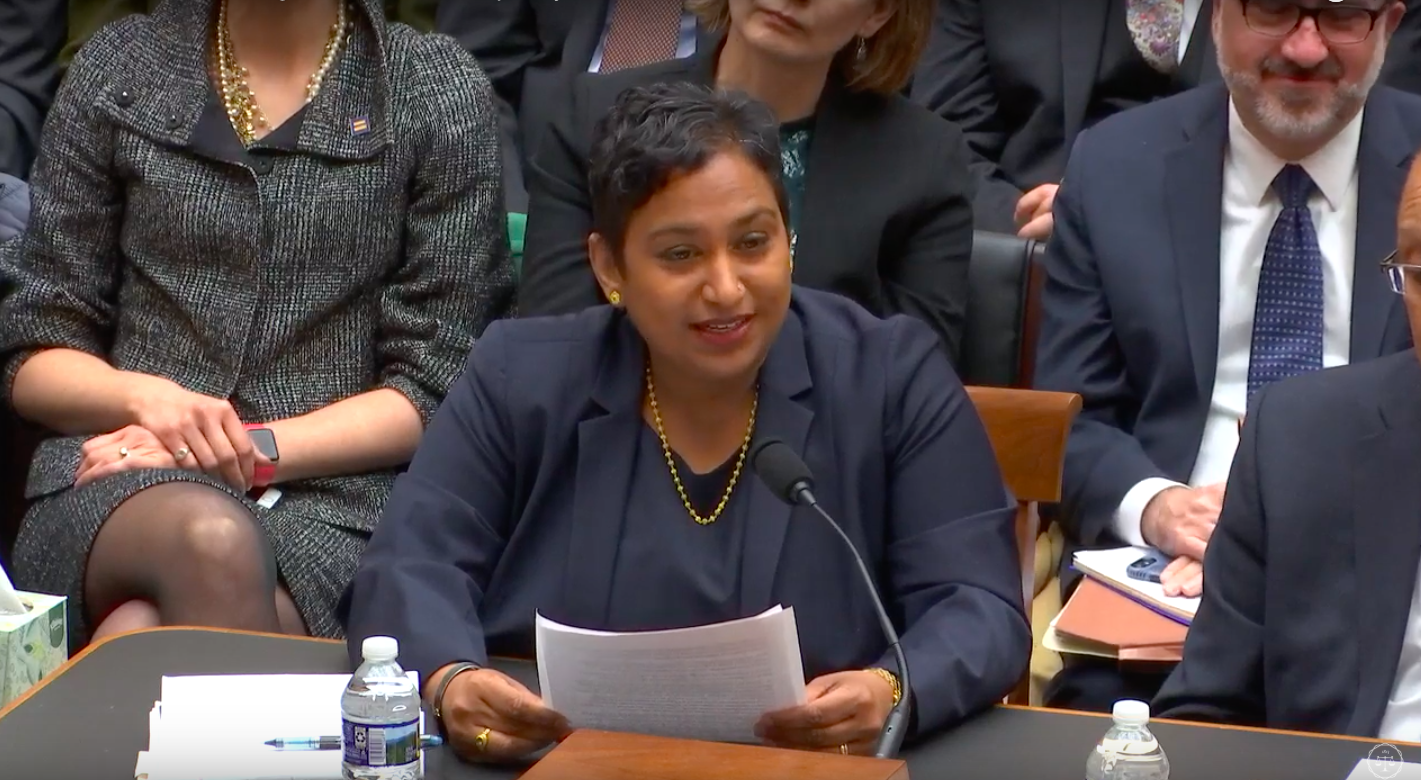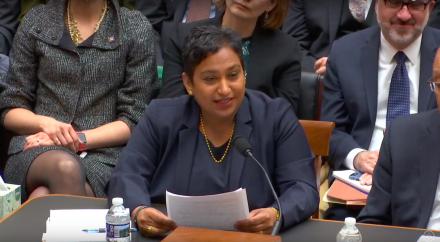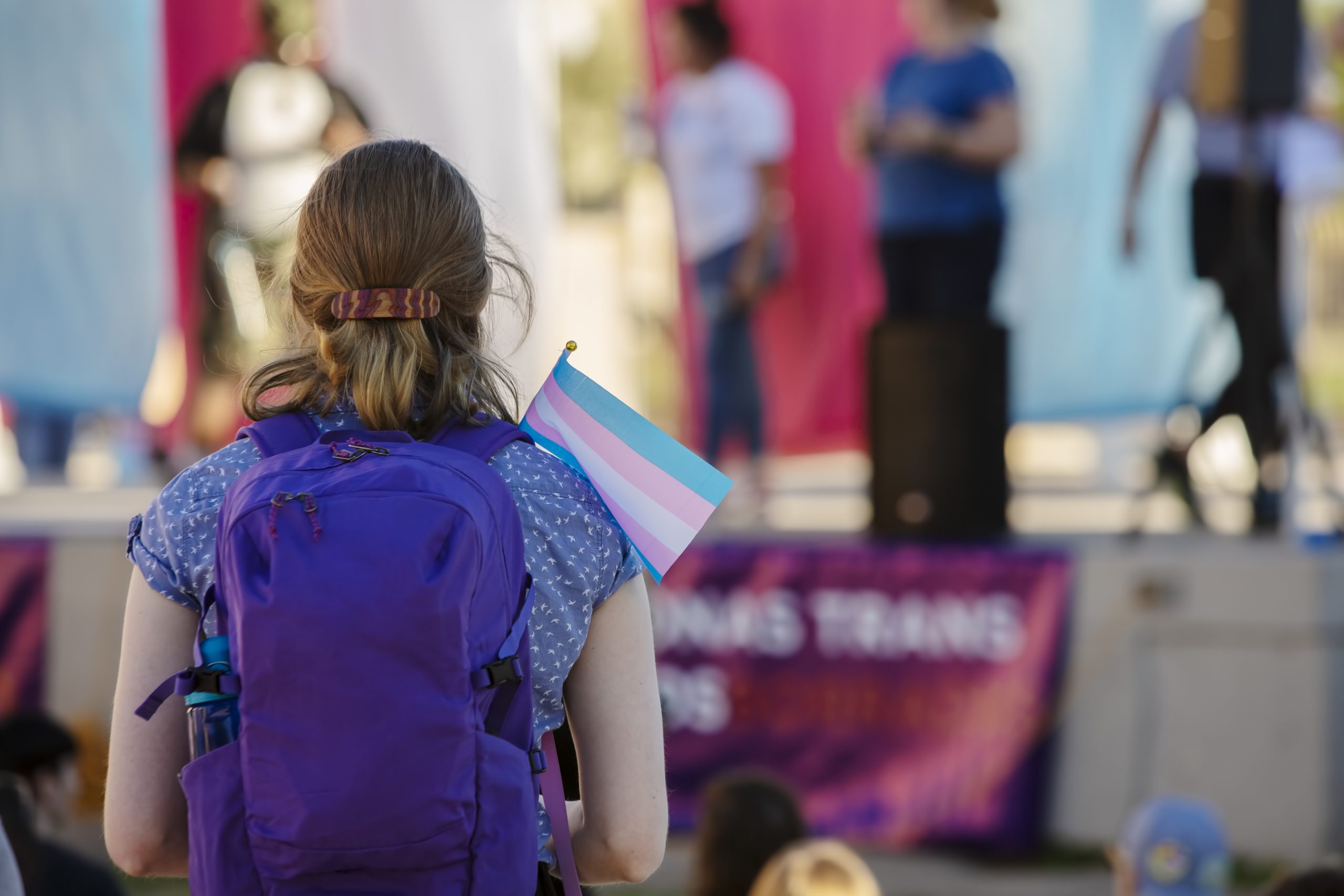Abortion rights, women of color, and LGBTQIA+ people are under attack. Pledge to join us in fighting for gender justice.
Speaking Up for Equality in the House of Representatives

 NWLC Legal Director Sunu P. Chandy testified in support of the Equality Act before the House Judiciary Committee’s Subcommittee on the Constitution, Civil Rights, and Civil Liberties on Tuesday, April 2, 2019. Her written testimony is below. You can watch the full hearing here.
NWLC Legal Director Sunu P. Chandy testified in support of the Equality Act before the House Judiciary Committee’s Subcommittee on the Constitution, Civil Rights, and Civil Liberties on Tuesday, April 2, 2019. Her written testimony is below. You can watch the full hearing here.
Good Morning Chair Nadler, Ranking Member Collins and Members of the Judiciary Committee,
Thank you for the opportunity to provide testimony in support of H.R. 5 – the Equality Act. My name is Sunu Chandy and I am the legal director of the National Women’s Law Center.
The Center has worked for more than 45 years to advance women’s equality and to remove barriers created by sex discrimination. Before joining the Center, I served in senior leadership roles at federal and local civil rights agencies and for 15 years before that I was a civil rights litigator. I have also been active with LGBTQ organizations including currently as a board member with the Transgender Law Center and in the past as a leader with South Asian LGBTQ organizations.
A few years ago, when my daughter’s first grade classmate said to her on the playground “but wait, you can’t have two moms,” I am proud that my daughter brought her principal over from the side to help explain, that yes, in fact, she can. We are urging Congress to pass the Equality Act so that all kids can have legal protections no matter their family structure. And as with any bill that seeks to amend existing civil rights laws, the Equality Act must be enacted in a way that expands – and never retreats from – our commitment to existing civil rights protections.
Support of the Equality Act is key to the National Women’s Law Center’s mission and critical for our collective liberation against sex discrimination as outlined here.
First, the Equality Act would provide explicit protections for LGBTQ people in employment, housing, credit, education, public spaces and services, federally funded programs, and jury service. The U.S. Supreme Court has long recognized that discriminating against someone because she does not conform to gender stereotypes is sex discrimination. And numerous federal courts have ruled that discrimination because of pregnancy and related conditions and because of sexual orientation or gender identity are also prohibited sex discrimination. The Equality Act would make these protections explicit in federal statutory law.
Second, the Act would ensure that all women, including LGTBQ individuals, would gain protections against sex discrimination in public spaces. This means individuals, including those who are pregnant, who experience sex discrimination including sexual harassment while in spaces such as restaurants or stores would have a legal remedy through the Equality Act.
Third, the Act would ensure that individuals gain new protections against sex discrimination by entities that take federal dollars including for example, schools, community centers and homeless shelters. The Equality Act would prohibit sex discrimination in these spaces.
Finally, the Act ensures that protections against discrimination in public spaces extend to all relevant entities. People of color continue to face discrimination regularly, for example in stores, or when seeking taxis. The Equality Act would prohibit this discrimination.
The Act protects freedom of religion through the existing thoughtful exemptions contained in federal civil rights statutes that protect religious actors from government intrusion.
For example, the current laws exempt private entities that are not open to the public. Churches holding services or spaghetti dinners can limit entry to their members. The current law allows religious entities to limit employment to members of their own faith and requires religious accommodations for employees. The current law also provide that religious entities are exempt from the fair housing laws when they use a dwelling for non-commercial purposes and in smaller buildings where the owner lives on the premises. In addition to maintaining these exemptions, the Equality Act clarifies that the Religious Freedom Restoration Act cannot be misused to allow violations of federal civil rights laws. This does not eliminate RFRA, but rather limits its reach so that it cannot be used as a defense to civil rights violations.
The Equality Act represents a significant advancement for all women and girls. And I want to be clear: the National Women’s Law Center supports the Act’s requirement that transgender women and girls be included with other women and girls in gender-specific spaces, including in sports programs. Our country has a history of attempting to justify sex discrimination by asserting that it is necessary to protect women. Just as this rationale fell short when excluding women from opportunities, it does not justify exclusion of transgender women and girls in sports, or any other context.
As a woman, a person of color, and a parent in a two-mommy family, I need the Equality Act. And as the daughter of a Christian minister and schoolteacher – immigrants from a small village in Kerala, India- it has been quite a journey towards family acceptance. Gaining explicit federal law protections provide not only legal rights but also an increased measure of dignity.
Over decades, through the courage of individuals coming forward with claims of discrimination, we have collectively expanded the scope of civil rights legal protections as one tool in our work for justice. We urge Congress to pass the Equality Act.





